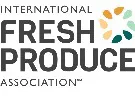International trade is an intricate business and one that last week’s IFPA Virtual Town Hall put into the spotlight with its session “Putting the “International” in IFPA: How Trade and International Politics Impact the Fresh Produce & Floral Marketplace.”
 Sharon Bomer Lauritsen, principal, AgTrade Strategies, LLC began the session from a policy and regulatory perspective looking at how to enhance exports at a fairly high level. She noted it’s important to recognize there are various “hoops” exporters have to jump through but that sometimes those hoops are simply used by governments to restrict imports.
Sharon Bomer Lauritsen, principal, AgTrade Strategies, LLC began the session from a policy and regulatory perspective looking at how to enhance exports at a fairly high level. She noted it’s important to recognize there are various “hoops” exporters have to jump through but that sometimes those hoops are simply used by governments to restrict imports.
Right: Sharon Bomer Lauritsen
Requirements to ship product may include requiring an import permit or meeting phytosanitary requirements dictated by the receiving country. The European Union for example is known for having a seemingly challenging barrier--a complicated tariff system on fresh produce. Tariff policy also is tied to whether U.S. shippers can be price competitive with their competitors who may get preferential rates in U.S. export markets.
New varieties in the market
Other factors to consider when determining trade possibilities is the influence of biotech and gene edited varieties entering into the marketplace. It’s important, she says, to pay attention to how foreign governments regulate those particular types of products.
But what notably is also increasingly challenging to exporters of produce are not just factors such as pesticide residues and limits, but also the more vague term of sustainability and how it’s applied to exports. There are discussions around applying sustainability metrics and objectives on imports.
She finally noted the importance of exporters advocating around the issue of barriers to export. Resolving unjustified barriers to exports requires sustained engagement and that can take years to fix and requires a drumbeat of support on trade agreements that provide an even playing field with competitors.
 Next, Cindy Smith, ag relations director, Gowan USA discussed the impact of pesticide residues on international trade. In the U.S., residues are set by the EPA and are called tolerances that govern the allowable amount of pesticide on a commodity. Internationally they’re referred to as MRLs or maximum residue levels and she adds that they aren’t safety standards per se--they are legal trading standards.
Next, Cindy Smith, ag relations director, Gowan USA discussed the impact of pesticide residues on international trade. In the U.S., residues are set by the EPA and are called tolerances that govern the allowable amount of pesticide on a commodity. Internationally they’re referred to as MRLs or maximum residue levels and she adds that they aren’t safety standards per se--they are legal trading standards.
Right: Cindy Smith
MRL level differences
Smith noted that the standards can differ greatly between countries so it’s important exporters have a thorough understanding of their markets and MRL requirements in those areas--some countries establish their own levels while others rely on Codex, the international body that sets MRL levels.
Those policies can also evolve--Mexico and Canada, two of the U.S.’ largest trading partners for fresh produce, are re-examining their pesticide regulatory laws currently. And exporters also need to be aware of particularly challenging countries or continents with regard to pesticide residue--notably, the European Union where not as many pesticides that are still legal to use in the U.S. have been renewed in the EU.
More recently, the EU has proposed taking into consideration environmental concerns when deciding on allowable MRLs, which are currently set based on concerns for human health. This move is seen as problematic given that environmental conditions around the globe are very different, as are pest pressures. This development is further being considered.
BJ Shannon, counsel, Alston & Bird wrapped up the session with a brief examination of trade agreements and customs enforcement.
Realigning policy  She began with trade agreements noting that the U.S. has seen significant realignment in the U.S. administration's form from tariff elimination to market access and other priorities for example. This realignment is having an impact on U.S. imports.
She began with trade agreements noting that the U.S. has seen significant realignment in the U.S. administration's form from tariff elimination to market access and other priorities for example. This realignment is having an impact on U.S. imports.
Right: BJ Shannon
She says the U.S. currently has free trade agreements with approximately 20 countries and the hallmark of all these agreements is reciprocal tariff elimination on imports of goods from partner countries. And in some current negotiations, there is a focus as well on fair and resilient trade but also with concerns for labor, digital trade, clean energy and anti-corruption factored in.
In customs enforcement, this too is folding in some of those factors. In December, Congress passed Uyghur Forced Labor Prevention Act (UFLPA) which creates the presumption that any U.S. imports with any content from the Xinjiang region in China are made with forced labor and are prohibited entry into the U.S. The legislation, she adds, is a reminder to importers to be diligent in finding suppliers and to look for visibility in supply chains.
Photo: Dreamstime
 For more information:
For more information:
Siobhan May
IFPA
+1 (302) 781-5855
[email protected]
www.freshproduce.com
